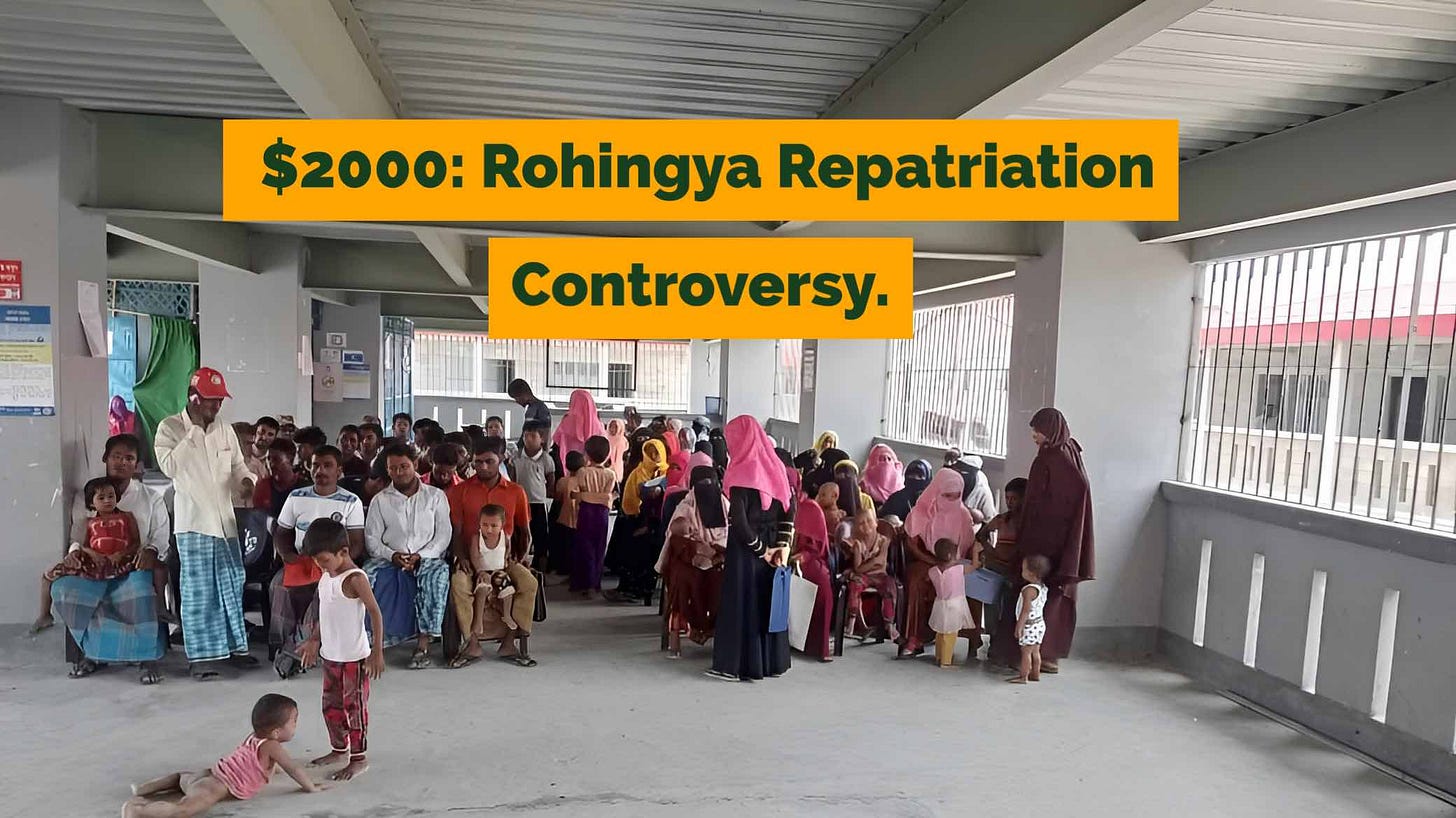Rohingya Pilot Repatriation: Coercion & Cash Incentives
Disturbing Methods and Coercive Cash Incentives Used to Encourage Rohingya Refugees' Return to Myanmar - a quick review of the last week.

Over the past week, I've immersed myself in a series of disconcerting audio and video recordings that starkly illustrate the ongoing concerns surrounding the “pilot repatriation” of Rohingya refugees.
Imagine, if you can, the grim reality encapsulated in these phrases - "You'll be beaten, over and over," or "This is not your father's land. You must return." The recipient of such chilling words? An elderly Rohingya refugee woman.
Statements like these provide a glimpse into the alarming array of distressing accounts I've encountered, each echoing the crisis at hand.
In one standout audio clip, an encounter unfolds between a refugee and an individual with an educated Bangladeshi accent, alleged to be from the NSI (National Security Intelligence) or DGFI (Directorate General of Forces Intelligence). This individual probes the refugee for his shed number, name, and other personal details, making it clear that he already has this information. Despite the pressure, the refugee stands his ground, respectfully but defiantly responding, "I don't know who you are. I am not going to tell you anything." His voice reveals palpable distress, yet he demonstrates a firm resolve not to succumb to intimidation.
In another testimony, a refugee courageously voices his opposition to returning to Myanmar. His video testimony serves as a catalogue of degrading treatment and threats, highlighting the significant challenges faced by those who dare dissent against repatriation efforts. The intensity of intimidation in his account was so alarming that I forwarded a summary of the information to various human rights agencies to alert them to the ongoing situation. Whether I publish his story will depend on the individual's circumstances.
Perhaps the most heartbreaking are the degrading accounts of parents being physically assaulted in front of their own children
Collectively, these accounts paint a vivid and deeply concerning picture of the human crisis unfolding daily. The voices within these recordings belong to real individuals, each grappling with a harsh, unbearable reality - the possibility of forced repatriation.
In my new article, published by The Diplomat and entitled "Cash Incentives and Coercion: Rohingya Repatriation Controversy," I shed light on the unsettling methods the Bangladesh authorities are reportedly using to encourage Rohingya refugees to return to Myanmar.
A key aspect of the article focuses on a cash incentive scheme rolled out on May 30th on Bhasan Char and a day earlier in Teknaf. Here, Rohingya families were promised $2,000 if they agreed to return to Myanmar. This brief article offers a snapshot of the tough circumstances these displaced people face.
I have written to the head of Refugee Relief and Repatriation Commissioner (RRRC) to inquire if this $2000 offer has been extended to all individuals listed and interviewed by the junta delegations that visited Teknaf. I also asked UNHCR what they know. UNHCR said they would get back to me…I am not holding my breath.
Understanding the scope and reach of this financial offer, which appears to be selective, is crucial for assessing its implications. It's concerning that the Bangladesh authorities have shown a historical lack of transparency, especially under these circumstances. If the authorities are indeed making this offer selectively to certain individuals or families, it could potentially signal desperation to meet their targeted number for volunteer repatriations. Such selective inducement raises serious ethical questions and concerns about fairness.
The selectivity brings into question the integrity of the decision-making process: who decides who receives the offer and on what basis? It undermines the principles of voluntary and informed repatriation, a cornerstone of ethical displacement management, which upholds that individuals should make their choices based on a genuine desire to return to their countries of origin, free from any undue influence or coercion.
